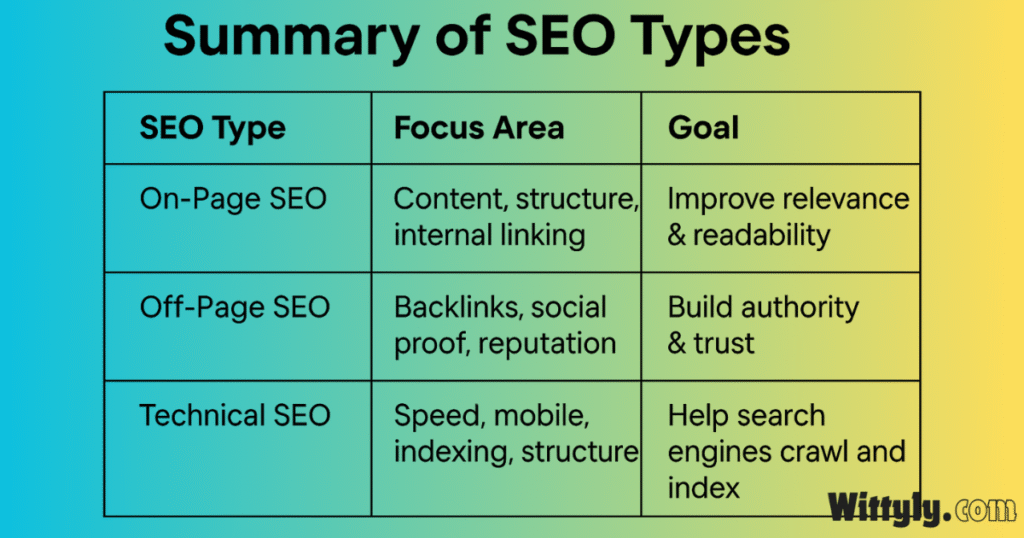Key Takeaways
· SEO in 2025 is driven by quality content, user intent, and technical performance.
· Master the three core types of SEO: on-page, off-page, and technical.
· Google ranks content using E-E-A-T, mobile usability, and Core Web Vitals.
· Tools like Ahrefs, SEMrush, and Google Search Console are essential for tracking and improving SEO.
· The focus is no longer just on keywords-user experience, trust, and helpful content are key to ranking higher.
Table of Contents
What Is SEO and Why Does It Matter in 2025?
Search Engine Optimization, or SEO, is the process of improving your website’s visibility on search engines like Google, Bing, or DuckDuckGo. When someone searches for a topic you’ve written about, SEO helps your website appear higher in the results—preferably on the first page. In 2025, this matters more than ever.
With the internet more crowded and competitive than at any point in history, mastering how to improve SEO is a critical skill for businesses, bloggers, creators, and marketers. Search engines are also smarter now, using advanced AI to understand content intent, user behavior, and site performance. This means old tricks like keyword stuffing or shady backlinks don’t work anymore—and might even hurt you.
Here’s why SEO still matters in 2025:
· Organic traffic is free: Unlike ads, it keeps coming without paying per click.
· Search is trust-based: People trust search engine results more than social media ads.
· Higher visibility = More authority: Ranking well builds your brand’s credibility.
· AI-driven search is stricter: Google’s AI updates now reward quality, relevance, and user experience.
In short, SEO in 2025 is about building a solid, valuable online presence—one that satisfies both humans and search engines.
Types of SEO: On-Page, Off-Page, and Technical
If you want to understand how to improve SEO, you first need to understand the three major types of SEO: on-page vs off-page, and technical. Each plays a different role, but all are essential for sustainable rankings.
✅ 1. On-Page SEO: Optimizing What’s On Your Site
On-page SEO is all about improving the content and structure of your website. In 2025, this means writing content that’s useful, well-organized, and speaks directly to your audience’s intent.
Key On-Page SEO Elements:
· Targeted Keywords
Use primary and secondary keywords naturally in your titles, headings, and content. For example, your blog title might be “How to Improve SEO in 2025”—with supporting phrases like SEO tips, search optimization, and content SEO throughout the post.
· Content Quality & Intent Matching
Google’s algorithms in 2025 are heavily intent-based. Your content must answer the searcher’s question better than your competitors.
· Header Structure (H1, H2, H3…)
Use headers properly to structure content. This makes it easier for both users and search engines to understand what your page is about.
· Internal Linking
Link to other relevant pages on your website to keep users engaged and help bots crawl your site more effectively.
· Meta Titles and Descriptions
Every page must have a unique and catchy meta title and meta description. This is your first impression in search results.
· Image Optimization
Use compressed images with descriptive file names and alt text. Tools like WebP and lazy loading can boost site speed.
· Mobile-Friendly Layout
Google is mobile-first now. Your site must look and work great on all devices.
Pro Tip: Use tools like Yoast SEO, Rank Math, or Surfer SEO to guide your on-page improvements.
✅ 2. Off-Page SEO: Building Authority Beyond Your Site
Off-page SEO refers to activities that happen outside your website but still affect your rankings. It’s mostly about building your authority, trustworthiness, and reputation in your industry.
Key Off-Page SEO Strategies:
· Backlink Building
Get other trustworthy websites to link back to your content. These are like votes of confidence in the eyes of search engines.
· Social Sharing & Brand Mentions
When your content gets shared on social media or mentioned in discussions, it signals that your brand is credible and popular.
· Guest Posting
Writing articles for other reputable sites can bring backlinks, referral traffic, and brand exposure.
· Local SEO Signals
For businesses, Google Business Profile (formerly Google My Business) updates, reviews, and local citations help boost visibility in local searches.
· Influencer & PR Collaborations
Strategic partnerships can expand your reach and lead to authoritative mentions or features.
Pro Tip: Focus on quality, not quantity. One backlink from a trusted domain (like Forbes or Medium) is more powerful than 50 random low-authority sites.
✅ 3. Technical SEO: Behind-the-Scenes Optimization
Technical SEO is all the behind-the-scenes work that helps search engines crawl, index, and rank your content efficiently. It ensures your site structure and performance are search-engine friendly.
Key Technical SEO Fixes:
· Site Speed Optimization
A slow website will hurt your rankings. Use tools like Google PageSpeed Insights or GTmetrix to test and fix loading times.
· Secure Website (HTTPS)
SSL certificates are a must in 2025. Google gives preference to secure sites.
· Mobile Responsiveness
Ensure every element adapts properly on mobile devices. This isn’t optional—it’s critical.
· XML Sitemap & Robots.txt
These files help search engines understand your site structure and which pages to index.
· Fix Broken Links
Dead pages and 404 errors hurt SEO. Regularly audit your site using tools like Screaming Frog or Ahrefs.
· Structured Data (Schema Markup)
Schema helps Google understand your content better and can lead to rich results (stars, FAQs, product info, etc.).
Pro Tip: Install an SEO audit tool or use Google Search Console to regularly check for technical issues.

📈 How Google Ranks Content in 2025?
Google’s algorithm has gone through massive updates over the years, and in 2025, it’s smarter than ever—thanks to AI and machine learning. If you’re wondering how to improve SEO in today’s landscape, you need to understand how Google ranks content now.
Here’s what truly matters in 2025:
✅ 1. Helpful Content is King
The Helpful Content Update remains a top priority. Google evaluates whether your content genuinely helps users rather than just chasing keywords.
What to do:
· Focus on real answers to search queries.
· Use conversational language that matches search intent.
· Avoid fluff, repetition, and AI-generated junk without editing.
✅ 2. E-E-A-T Framework
Google uses the E-E-A-T model (Experience, Expertise, Authoritativeness, Trustworthiness) to evaluate content quality.
What to do:
· Show first-hand experience when possible (e.g., reviews, case studies).
· Mention credentials or real authorship for sensitive topics.
· Get cited by reputable sources to build authority.
· Use HTTPS and proper UX to build trust.
✅ 3. Search Intent Matching
The algorithm now understands why a person is searching—informational, navigational, transactional, or commercial.
What to do:
· Make sure your page matches the intent behind the keyword.
· Use long-tail variations and related phrases.
· Structure the content with FAQs, images, and tables for clarity.
✅ 4. Core Web Vitals
These measure user experience metrics like loading time, interactivity, and visual stability.
What to do:
· Optimize Largest Contentful Paint (LCP)
· Minimize layout shifts (CLS)
· Improve Time to Interactive (TTI)
Use PageSpeed Insights and Lighthouse to test and improve performance.
✅ 5. Mobile & Voice Search Optimization
With voice searches and mobile usage increasing, your site must be accessible, fast, and responsive.
What to do:
· Use natural-sounding phrases and questions.
· Structure content for featured snippets (also known as position zero).
· Make sure text is readable on all screen sizes.
✅ 6. Freshness and Topical Authority
Google favors websites that continuously update and cover topics in depth.
What to do:
· Regularly update outdated articles.
· Cover subtopics (known as content clusters) to show subject mastery.
· Build a topical map around your niche.
Understanding how Google ranks content in 2025 helps you write and structure your website in a way that both search engines and users love.
🔧 Introduction to Key Tools (Ahrefs, SEMrush, Google Search Console)
Now that you understand what matters to Google, the next step in learning how to improve SEO is to use the right tools. SEO isn’t guesswork anymore—it’s a data-driven game.
Read more: Top Website Tools and Plugins Every Digital Marketer Needs
Here are the three essential SEO tools you should be using in 2025:
1. Ahrefs
Ahrefs is a powerful SEO tool used by professionals to improve site visibility, track competitors, and analyze backlink profiles.
What You Can Do with Ahrefs:
· Keyword Explorer: Find profitable keywords and their difficulty levels.
· Site Explorer: Analyze any domain’s traffic, backlinks, and ranking pages.
· Content Gap: Discover keywords your competitors rank for—but you don’t.
· Backlink Audit: Spot toxic links or identify link-building opportunities.
Pro Tip: Use Ahrefs to build a content strategy around high-volume, low-competition keywords.
2. SEMrush
SEMrush is another all-in-one SEO and marketing suite. It’s especially useful for competitive research and content marketing.
Key Features of SEMrush:
· SEO Audit Tool: Scan your site for technical issues.
· Keyword Magic Tool: Discover keyword clusters and search trends.
· Position Tracking: Monitor how your pages rank daily or weekly.
· Content Marketing Toolkit: Get suggestions for optimizing blog posts.
Pro Tip: SEMrush’s Topic Research tool is great for building pillar + cluster content models.
3. Google Search Console (Free!)
This free tool from Google is essential to understanding how your website performs in organic search.
Key Benefits:
· Performance Report: Track clicks, impressions, and average position.
· Coverage Report: See what pages are indexed or blocked.
· URL Inspection Tool: Check crawl status and indexing issues.
· Enhancements: Monitor Core Web Vitals, Mobile Usability, and more.
Pro Tip: Submit your XML sitemap here and fix any coverage errors Google reports.
🛠 Which Tool Is Best?
| Tool | Best For | Price Range |
| Ahrefs | Backlink analysis, keyword research | Paid (Pro plans) |
| SEMrush | Content & competitor research | Paid (7-day trial) |
| Google Search Console | Site health, indexing, SEO basics | Free |
Tip: Start with Google Search Console, and as your site grows, invest in Ahrefs or SEMrush for advanced SEO management.
Summary
Improving SEO in 2025 requires a modern approach that balances high-quality content with technical precision. Search engines like Google now prioritize user-focused content that demonstrates experience, expertise, authority, and trust (E-E-A-T). To rank well, websites must match search intent, optimize for mobile and voice search, and deliver fast, stable performance. Simply inserting keywords is no longer enough—content must be helpful, engaging, and structured for both users and search engine crawlers.
To achieve lasting SEO success, it’s crucial to master all three types of SEO: on-page, off-page, and technical. Using powerful tools like Google Search Console, Ahrefs, and SEMrush allows you to track rankings, identify performance issues, analyze competitors, and find new keyword opportunities. When done right, SEO remains one of the most effective ways to build authority, drive organic traffic, and grow your online presence in an increasingly competitive digital space.
FAQs
1. What are the best ways to improve SEO in 2025?
To improve SEO in 2025, focus on publishing high-quality, helpful content, optimizing for search intent, improving site speed, building backlinks, and using SEO tools like Ahrefs and Google Search Console to monitor performance.
2. Does SEO still work in 2025?
Yes, SEO remains one of the most effective ways to drive organic traffic in 2025. However, success now requires a focus on user experience, relevance, and content authority rather than outdated tricks.
3. What are the key types of SEO I need to know?
There are three main types of SEO: on-page SEO (content and structure), off-page SEO (backlinks and reputation), and technical SEO (speed, indexing, mobile optimization).
4. How does Google rank websites today?
In 2025, Google ranks content based on helpfulness, E-E-A-T (Experience, Expertise, Authority, Trust), mobile-friendliness, page speed, user experience, and how well your content matches search intent.
5. Which SEO tools should I use to boost rankings?
Start with Google Search Console for free site monitoring. Then upgrade to premium tools like Ahrefs or SEMrush for advanced keyword tracking, backlink audits, competitor analysis, and content optimization.
Wittyly is a content-driven platform powered by a team of SEO experts, writers, and digital marketers who are passionate about helping businesses grow online. From actionable marketing guides to expertly crafted branding strategies, Wittyly delivers high-quality, well-researched content you can trust. Every article is professionally written and thoroughly proofread to ensure accuracy, clarity, and value for readers across industries.
Email: Contact@wittyly.com



